What is a recession and how could one affect me?published at 15:26 BST 4 August 2022
A recession means the UK economy has shrunk for two three-month periods - or quarters - in a row.
Read MoreGDP figures show the UK economy shrunk by 20.4% in April - the biggest contraction on record
First Minister Nicola Sturgeon calls for the UK government to extend the furlough scheme
Three more patients who tested positive have died in Scotland, taking the total by that measure to 2,442
Scottish Secretary Alistair Jack calls for the current two-metre distancing rule to be relaxed as soon as it is safe to do so
Scotland's hospitality trade 'risks losing 40,000 jobs' unless the two-metre rule is reduced
The Scottish government's growth commission chairman says Scotland is more exposed to the impact of the Covid crisis
Hope Street in Glasgow is identified as the pollution hot-spot with Britain's biggest improvement in air quality
BBC Scotland News
A recession means the UK economy has shrunk for two three-month periods - or quarters - in a row.
Read MoreAs we conclude our live coverage for today, here is a reminder of Friday's headlines:
We'll be back with more live coverage in the morning. Stay safe and have a good evening.
Allow X content?
This article contains content provided by X. We ask for your permission before anything is loaded, as they may be using cookies and other technologies. You may want to read X’s cookie policy, external and privacy policy, external before accepting. To view this content choose ‘accept and continue’.
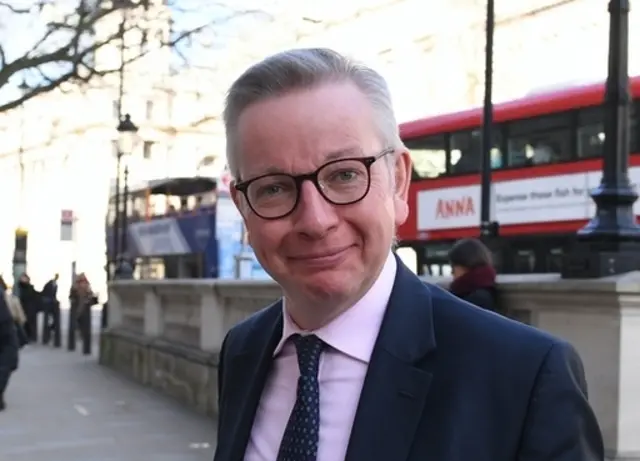 Image source, PA Media
Image source, PA MediaThe UK government has rejected calls by the first ministers of Scotland and Wales to delay Brexit because of the economic impact of the Covid-19 crisis.
Cabinet Office minister Michael Gove said: "The moment for extension has now passed. That's it. We are leaving the transition period on December 31st. That provides clarity and certainty to business.
"Our announcement today allows business to plan in an appropriate and flexible way for our departure from the European Union as we take back control."
Mr Gove was speaking after he had chaired a “constructive” meeting of the EU Joint Committee with EU commission vice-president for Interinstitutional Relations Maros Sefcovic.
Quote MessageNot extending the deadline is extraordinarily reckless and is catastrophic for business. It will pile a further economic and social shock on top of the crisis that is already hitting business because of the virus
Kate Forbes, Scottish government Finance Secretary
 Drivetime with Fiona Stalker
Drivetime with Fiona Stalker
BBC Radio Scotland
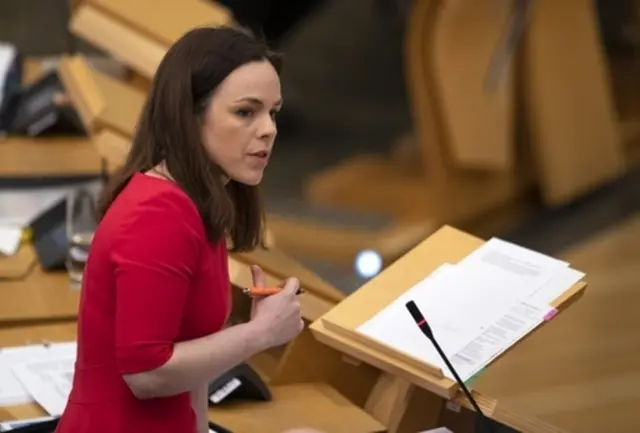 Image source, PA Media
Image source, PA MediaThe Scottish government is urging its UK counterpart to follow the example of countries like France, which has extended financial support to businesses by up to two years, Finance Secretary Kate Forbes tells BBC Radio Scotland.
The call for Britain's furlough scheme, which helps companies retain employees, to last beyond the autumn comes after it was confirmed the UK economy suffered its biggest-ever contraction during April.
"I think it's clear from today's figures that the health crisis has had an economic impact of such a magnitude that our priority must be supporting the economy as much as we can," Ms Forbes says.
"Give credit where it's due to the UK government, the furlough scheme has prevented, or certainly reduced, the unemployment rate. But businesses are looking to the cliff edge of the autumn and determining they will be unable to keep people in work if there isn't an extension to business support."
Quote MessageThe UK government can borrow to provide that financial support. The Scottish government can't, so we are reliant on the UK government."
Kate Forbes
Allow X content?
This article contains content provided by X. We ask for your permission before anything is loaded, as they may be using cookies and other technologies. You may want to read X’s cookie policy, external and privacy policy, external before accepting. To view this content choose ‘accept and continue’.
 Drivetime with Fiona Stalker
Drivetime with Fiona Stalker
BBC Radio Scotland
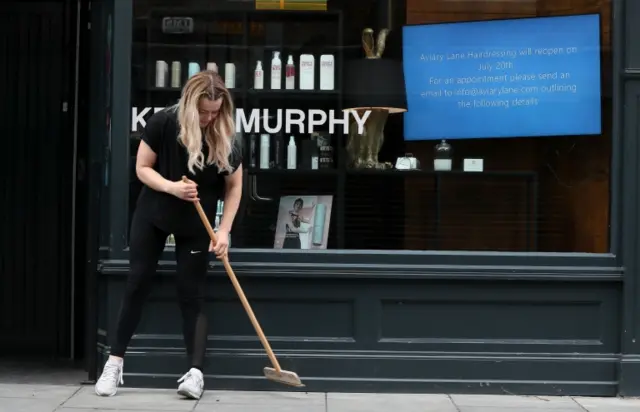 Image source, PA Media
Image source, PA MediaHair salons in Ireland may be allowed to reopen earlier than previously planned
Hairdressers say they are having to employ "complete guesswork" as they try to work out when they might be able to open again.
"The most important thing for us would be for clients to return to the salon," says Mark McCune of the National Hair & Beauty Federation. "We don't really have a business without them."
The industry contributes £600m annually to Scotland's economy and is desperate for guidance from the government so they can prepare properly.
Riccardo Corvi, a director of one of Rainbow Room's 20 salons in Scotland, says the company has protective equipment and screens in place and are "good to go".
What they need most, he says, is a definite date to work towards - the industry is part of phase three of lockdown easing, so anticipates a possible return in mid-July - and guidance on the square footage per client required.
He says with clients needing to be spaced out, salons will need to extend opening hours.
Quote MessageI do realise the difficulties faced by industries like hairdressing with social distancing and it will probably be beyond phase four in terms of being able to reopen. We do publish detailed guidance before asking any sector to reopen."
Kate Forbes, Finance Secretary
Allow X content?
This article contains content provided by X. We ask for your permission before anything is loaded, as they may be using cookies and other technologies. You may want to read X’s cookie policy, external and privacy policy, external before accepting. To view this content choose ‘accept and continue’.
Allow X content?
This article contains content provided by X. We ask for your permission before anything is loaded, as they may be using cookies and other technologies. You may want to read X’s cookie policy, external and privacy policy, external before accepting. To view this content choose ‘accept and continue’.
Paul O'Hare
BBC Scotland News
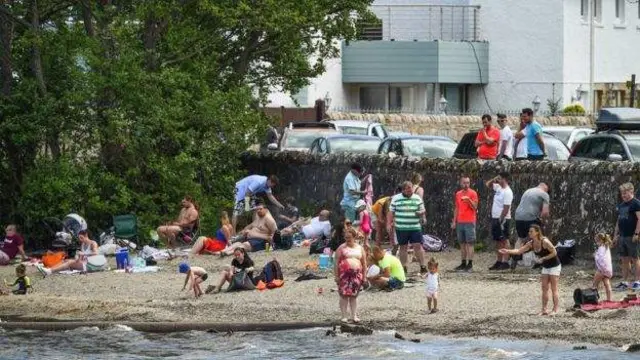 Image source, Getty Images
Image source, Getty ImagesPolice Scotland issued 35 fines last week to people who flouted the Covid-19 restrictions.
The figures, the second to be published since Scotland moved into phase one of lockdown easing, also revealed officers only made nine arrests.
The statistics show a 68% drop in the number of fixed penalty notices handed out, compared to 110 the previous week. This brings the total since the measures were introduced to 3,248.
Fines start at £30, doubling to £60 if they are not paid within 28 days. Repeat offenders can face penalties of up to £960.
The update, for week ending 10 June, confirms a dozen individuals were dispersed using "reasonable force" compared to 36 the previous week.
A total of 609 were "dispersed when instructed" while the number "dispersed when informed" was 2,449.
 Drivetime with Fiona Stalker
Drivetime with Fiona Stalker
BBC Radio Scotland
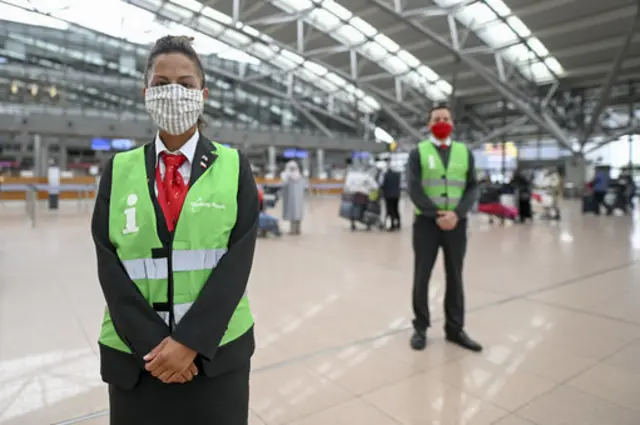 Image source, PA Media
Image source, PA MediaIt will take two to three years before air travel will return to levels reached at the end of 2019, former airline boss Tim Jeans tells BBC Radio Scotland.
The former Monarch chief executive, who is now chairman of Newquay Airport, says air travel will be unrecognisable once flights start regularly again.
"There will be less flights, there will be certainly less seats available, the whole experience of travelling by air will be different; airports will look and feel different," he says. "We will largely be having to wear some form of personal protection equipment."
He expects that to become the norm, "certainly until a vaccine is found and we've been able to get the pandemic under control".
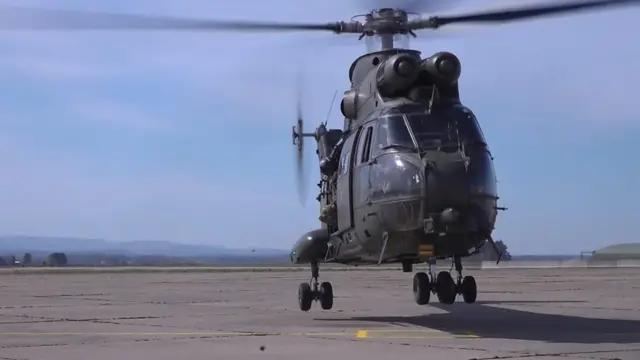
Three RAF Puma helicopters stationed at Kinloss Barracks in Moray since March to help transport patients during the coronavirus pandemic are returning to their base in Oxfordshire.
The Ministry of Defence says they can swiftly redeploy the aircraft to Scotland if needed again in the future.
At the start of the pandemic it was feared the number of patients would overwhelm Scotland’s existing air ambulance capacity.
The crews trained with the Scottish Ambulance Service to move highly infectious patients from remote and rural areas, as well as from oil platforms in the North Sea.
 Drivetime with Fiona Stalker
Drivetime with Fiona Stalker
BBC Radio Scotland
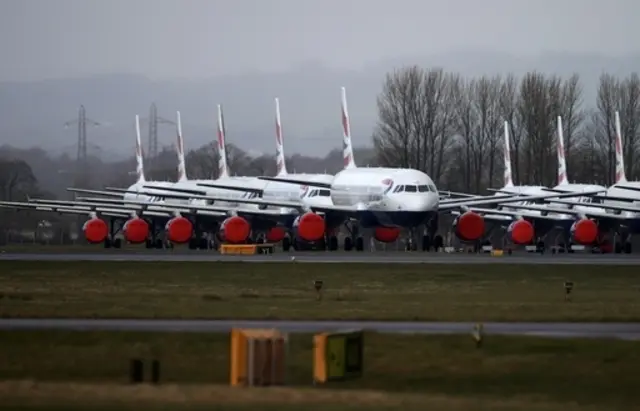 Image source, SNS
Image source, SNSIntroducing quarantine at British airports now rather than at the start of the Covid-19 pandemic "seems perverse almost" and threatens thousands of jobs for "marginal benefits", the former managing director of Monarch Airlines argues.
Tim Jeans, now chairman of Newquay Airport in Cornwall, explains to BBC Radio Scotland why British Airways, Ryanair and EasyJet today filed a legal challenge of the measure brought in by the UK government.
"Just as we saw the first signs of the industry being able to unlock and for passengers to start moving and generating income and start to eat into the enormous losses the industry is facing, we get effectively a complete clampdown on people's ability to travel," he says.
Mr Jeans suggests that, had quarantine been introduced at the beginning or middle of March, it would have been effective, but he says "huge numbers of infected individuals" were allowed to arrive unchecked from countries like Italy, Spain and China.
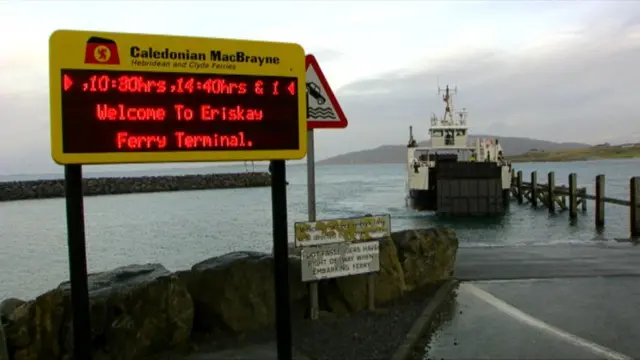
Western Isles local authority, Comhairle nan Eilean Siar, says families should be allowed to travel between islands to visit each other.
Journeys on Caledonian MacBrayne's ferries have been restricted to key workers, the delivery of supplies and essential travel since late March as part of efforts to restrict the spread of coronavirus.
The authority is holding discussions with CalMac and Transport Scotland about an easing of inter-island ferry restrictions for families living in the islands.
 Drivetime with Fiona Stalker
Drivetime with Fiona Stalker
BBC Radio Scotland
 Image source, PA Media
Image source, PA MediaDoes the world have leaders who can lead it out of economic crisis?
"A pretty toxic, poisonous" combination of factors will make it more difficult for the British economy to bounce back from the record contraction announced today as a result of the Covid-19 crisis, financial analyst Justin Urquhart Stewart tells BBC Radio Scotland.
He believes a coordinated plan similar to Franklin D Roosevelt's New Deal, which helped the world economy recover from the Great Depression of the 1930s, is needed.
"Unfortunately, we don't have that sort of leadership," Mr Stewart suggests.
Quote MessageWe have someone rather strange at the White House and in Europe we are losing Mrs Merkel and we've got Brexit to manage as well and we seem to be having a Chinese cold war."
Justin Urquhart Stewart, Financial analyst
He suggests that, although the figures are worrying and the headlines "perturbing", everyone knew the economy would be hit by the pandemic and "it was not as bad as some of us were thinking it would be".
Mr Stewart suggests that figures for May and June will be just as bad but thinks the way to recovery for the Scottish economy is to rekindle confidence to the retail sector while concentrating on building local businesses and smaller supply chains.
UK Transport Secrteray Grant Shapps says the latest figures from the Office for National Statistics infection survey show "encouraging progress".
Around one in 1,700 people were infected between 25 May and 7 June, or 33,000 individuals, compared to one in 1,000 before then.
He confirms yesterday's testing figure was 193,253 – this official figure also includes testing kits posted out on the day.
But he says despite an increase in testing, new cases continue to fall.
You can follow updates from the briefing here.
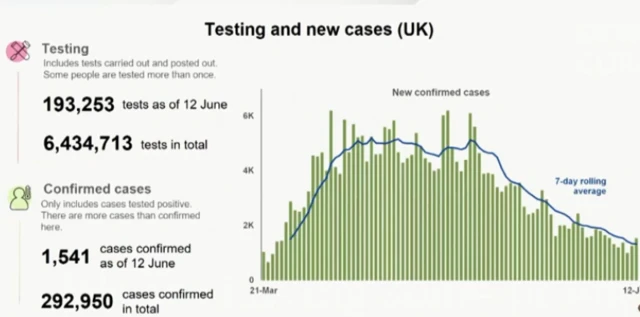
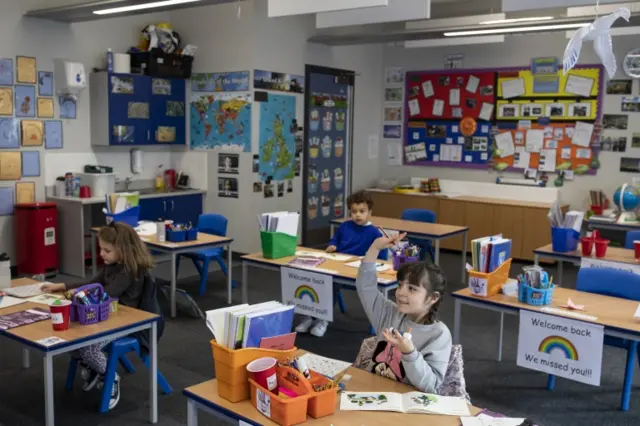 Image source, Getty Images
Image source, Getty ImagesSome pupils have returned to school in England in classrooms with social distancing
Edinburgh Council has confirmed that schools in the capital will re-open for the new term on Wednesday, 12 August.
In-school learning will take place from Mondays to Thursdays, with children attending for whole days.
Fridays will be used by staff to support home learning, with limited childcare support for key workers continuing throughout the week, including Fridays.
Not all children will be able to return to school at the same time, with parents told they will be informed before 24 June which days their children will be in school.
In early learning and primary schools, children will be grouped together to enable family members to attend school on the same full day.
In secondary schools, pupils will be grouped together either by year group or family group depending on the individual arrangements made by each school.
Quote MessageThe new blended model of learning represents an improvement on the current home learning arrangements and, though far from ideal, we will review, refine and improve the arrangements as conditions allow
Alistair Gaw, Executive Director for Communities and Families, Edinburgh Council
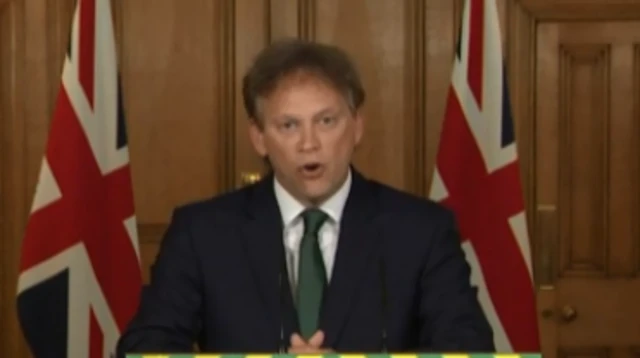
Transport Secretary Grant Shapps is leading the UK government's daily briefing today.
He says the latest estimate from the Sage advisory group is that the R number - the number of people each infected person, on average, passes the virus onto - for the UK remains unchanged at between 0.7 and 0.9.
You can follow updates here.
 Image source, PA Media
Image source, PA MediaAndy Murray (left) has not played since November's Davis Cup finals because of a bruise on his pelvic bone
Andy Murray will face Kyle Edmund at this month's 'Battle of the Brits' as competitive tennis returns after being postponed by the Covid-19 crisis.
The former world number one, making his first appearance in seven months, has been drawn in the "Henman Group" with Edmund, Liam Broady and James Ward.
British number one Dan Evans, Cameron Norrie, Jay Clarke and Jack Draper have been drawn in the "Rusedski Group".
The tournament - organised by Jamie Murray - at the National Tennis Centre in Roehampton from 23-29 June will raise money for NHS Charities Together.
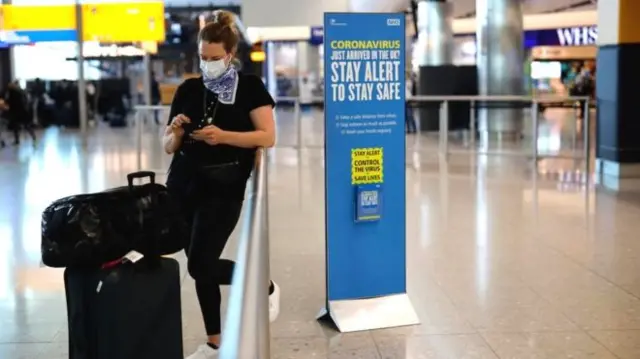 Image source, Getty
Image source, GettyHighlands and Islands Airports Ltd (Hial) has warned that passengers who do not wear face coverings may not be allowed to travel.
The Scottish government-owned company is preparing for the reopening of its sites in the Highlands, Argyll, Western Isles and Northern Isles and Dundee to commercial flights. Some flights to and from Inverness are due to resume on 15 June.
Hial says as part of social distancing measures, passengers will be required to wear face coverings before entering its airport terminals and must keep them in place until their journeys are completed.
It says passengers should use their own face coverings, although a limited number may be available at airports.
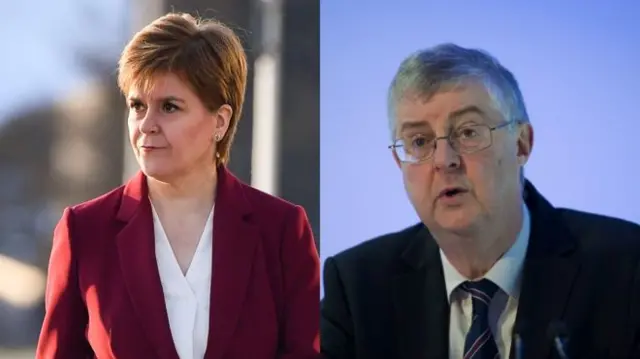 Image source, Getty Images
Image source, Getty ImagesThe first ministers of Scotland and Wales have written to Boris Johnson to request an extension to the Brexit transition period.
Nicola Sturgeon and Mark Drakeford believe more time is required to complete negotiations and support businesses in their recovery from the coronavirus pandemic.
They have warned that exiting when the transition period is scheduled to finish on 31 December would be "extraordinarily reckless".
The European Union open to extending the period, if an application to do so is made by 1 July.
But Cabinet Office minister Michael Gove has responded, insisting the UK will be leaving as planned.
"That’s it," he said. "We are leaving the transition period on 31 December. That provides a clarity and certainty for business, and allows them to plan in an appropriate and flexible way for our departure."